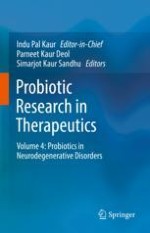2022 | OriginalPaper | Buchkapitel
10. Animal Models Used for Studying the Benefits of Probiotics in Neurodegeneration
verfasst von : G. Divyashri, S. G. Prapulla
Erschienen in: Probiotic Research in Therapeutics
Verlag: Springer Nature Singapore
Aktivieren Sie unsere intelligente Suche, um passende Fachinhalte oder Patente zu finden.
Wählen Sie Textabschnitte aus um mit Künstlicher Intelligenz passenden Patente zu finden. powered by
Markieren Sie Textabschnitte, um KI-gestützt weitere passende Inhalte zu finden. powered by
